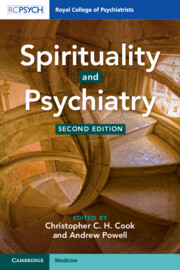Book contents
- Spirituality and Psychiatry
- Spirituality and Psychiatry
- Copyright page
- Contents
- Figures
- Tables
- Boxes
- Contributors
- Foreword to the Second Edition
- Foreword to the First Edition
- Preface to the Second Edition
- Preface to the First Edition
- Acknowledgements
- The Spirituality and Psychiatry Special Interest Group of the Royal College of Psychiatrists: A Personal Reflection
- Chapter 1 Spirituality and Religion in Psychiatry
- Chapter 2 Spiritual Assessment
- Chapter 3 Psychosis
- Chapter 4 Suicide
- Chapter 5 Child and Adolescent Psychiatry
- Chapter 6 Psychotherapy
- Chapter 7 Intellectual Disability
- Chapter 8 Substance Misuse and Addiction
- Chapter 9 Common Mental Disorders
- Chapter 10 Forensic Psychiatry
- Chapter 11 Meditation, Prayer and Healing
- Chapter 12 Religion and Spirituality in the DSM and ICD
- Chapter 13 Spiritual Care in the NHS
- Chapter 14 Spiritual and Religious Interventions
- Chapter 15 The Patient Perspective
- Chapter 16 Religion and Religious Experience
- Chapter 17 Pathological Spirituality
- Chapter 18 Ageing
- Glossary
- Index
- Plate Section (PDF Only)
- References
Chapter 14 - Spiritual and Religious Interventions
Introduction
Published online by Cambridge University Press: 07 October 2022
- Spirituality and Psychiatry
- Spirituality and Psychiatry
- Copyright page
- Contents
- Figures
- Tables
- Boxes
- Contributors
- Foreword to the Second Edition
- Foreword to the First Edition
- Preface to the Second Edition
- Preface to the First Edition
- Acknowledgements
- The Spirituality and Psychiatry Special Interest Group of the Royal College of Psychiatrists: A Personal Reflection
- Chapter 1 Spirituality and Religion in Psychiatry
- Chapter 2 Spiritual Assessment
- Chapter 3 Psychosis
- Chapter 4 Suicide
- Chapter 5 Child and Adolescent Psychiatry
- Chapter 6 Psychotherapy
- Chapter 7 Intellectual Disability
- Chapter 8 Substance Misuse and Addiction
- Chapter 9 Common Mental Disorders
- Chapter 10 Forensic Psychiatry
- Chapter 11 Meditation, Prayer and Healing
- Chapter 12 Religion and Spirituality in the DSM and ICD
- Chapter 13 Spiritual Care in the NHS
- Chapter 14 Spiritual and Religious Interventions
- Chapter 15 The Patient Perspective
- Chapter 16 Religion and Religious Experience
- Chapter 17 Pathological Spirituality
- Chapter 18 Ageing
- Glossary
- Index
- Plate Section (PDF Only)
- References
Summary
As other chapters in this book have made clear, spirituality has a part to play in treatment planning in all areas of psychiatry. Patient-centred psychiatry will always properly consider the ways in which the spiritual/religious concerns of patients might have an impact upon treatment. These concerns can often be utilised to good effect, but sometimes, if they go unrecognised, they may present barriers to effective treatment. It is important to know, for example, if a patient might not take their prescribed medication because they feel that they need to trust in God, rather than in tablets. More positively, prayer, meditation and other religious practices can provide significant coping resources during the course of treatment and recovery, and it is helpful for the clinician to affirm this rather than neglect or, worse still, undermine it.
- Type
- Chapter
- Information
- Spirituality and Psychiatry , pp. 249 - 251Publisher: Cambridge University PressPrint publication year: 2022



